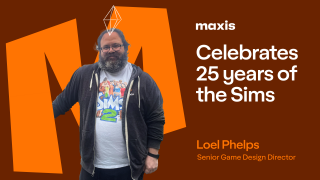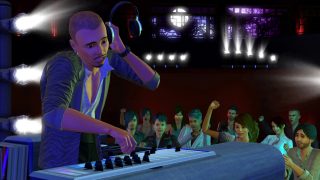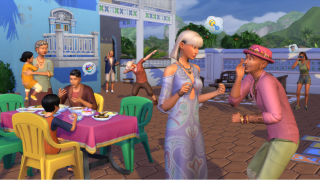Celebrating 25 Years of The Sims: Loel Phelps
Commemorate The Sims 25th Birthday with a look back at its most impactful updates, according to the team behind the games.

For the past 25 years, our team has poured its passion into deep, thoughtful, and authentic experiences that reflect life’s many possibilities (as well as a few fantastical possibilities we wish existed). But life, as it turns out, is pretty darn big, which is why we’re constantly introducing new content and features to expand The Sims universe into a story-telling platform that’s representative of its player community.
As part of our ongoing birthday celebration, we’re talking to our team members about the most meaningful projects they’ve been a part of since joining The Sims family and exploring the ways in which their unique perspectives have informed the features and updates we’ve added over the past 25 years. For our final (for now) entry into our anniversary celebration series, we spoke with Senior Game Design Director Loel Phelps about all 14 years he’s spent on The Sims, a tenure that’s spanned near countless updates and additions that have better enabled players of all types to see their lives reflected in the game.

What was your first role on The Sims, and how has it changed over time?
I've been at Maxis for 14 years, but this is my 20th year at EA. It's kind of crazy to think I've been with one company for 20 years, and it's really interesting to learn that there are a lot of people at Maxis that have been here a really long time. This is a studio that's got some tenure and that is kind of unprecedented in the industry. I think it comes down to the people that you work with everyday.
What's really interesting about Maxis – which I was worried about when I first joined – is the product itself. The first decade of my career was focused on level design, and that's not really a skill I get to leverage at Maxis very often. So when I first joined Maxis, I was like, “This is going to ruin my career because I'm a level designer and I don't know how I'm going to use my skills.” [laughs] But I talked to the Creative Director at the time, and he encouraged me, “Play the game for 200 hours. You'll know what it is. You'll figure it out. You kind of fall in love with it.” And that was 100% true, this game – The Sims – is unlike any other and it is the hardest game I’ve ever had the pleasure to work on and I’m always finding new challenges and problems, and stories I want to tell.
I started at Maxis as a lead designer, and now I'm a senior game design director. So my area of impact has grown significantly, but the work I do day to day is not actually that different, which is kind of nice, actually. Being a lead designer is like shepherding a small team coming up with features and helping the team figure out what the right shapes of those designs are. But as I move into game design direction, it's about a much bigger set of people. I get to work with all of the teams, and I get to set some best practices for how to think about what players are asking for.
I also get to listen to our players more than I ever have. I get to sit in on our research, and I get to talk to our players about where they are having challenges and how I can get what they want directly back into the game. That's the beauty of my job right now: I have that 10,000 foot view where I can look three years in the future, and go, “If the team does this here and this here and this here, players will finally be able to do this really big thing they’ve always wanted.” That wasn't something I could do when I first started.
What’s the first thing you worked on?
I had the pleasure of working on the singing career in The Sims 3: Showtime. Up to that point, when you would do a stage performance or do any kind of performance in the game, you'd say, “Play an instrument,” and your Sim would just go and do it. You had no agency over how they did it. So I was excited to work with Robi, our audio director, on how to make something that you could actually control. So if you want to perform a song with four verses and four courses, you could do that. If you wanted to hype up the crowd in the middle of your song, you could do that. It was about finding ways to give players a lot more control over the stage performance in a game that hadn't really done that to date. And if you wanted to watch it play out instead of control it, you could do that, too. Like, you just set it, and they would go perform. But I wanted players to be able to build a performance and actually feel like they're having stage anxiety and pressures and actually being able to be successful on the stage.

What’s the most meaningful thing you’ve worked on and why?
My husband and our daughter and I currently have grandpa living downstairs. So for me, I was trying to figure out, “How do we represent this multigenerational living experience that so many people have?” So, thinking about the For Rent Expansion Pack, we intentionally went out of our way to create options for lots of people to live in the way they actually live in the real world. It's not just high rise apartments, but it's apartment blocks with lots of different families living in a shared community space. For me, that was one of those things that… you couldn't tell that story in The Sims until we had For Rent. But the vast majority of the world lives that way. We don't live in single family homes, most people, especially around the world. So for me, that was probably the most impactful thing of recent note.
I could also go all the way back to lactose intolerance. I'm lactose intolerant, and getting that trait in the game, made me feel seen. That was small, but also important to me. In The Sims 3, I was always trying to push the boundaries with representation of different lifestyles and kinds of families that exist both in game and in screenshots. And that was a struggle even though that was only 15 years ago. But I think we've made huge growth since then and I’m happy to be on a team where representation is an important value that everyone looks out for.
How does your personal experience help shape your work?
Having a child drastically changed how I perceived not just being a parent in the game or being a parent in real life, but also what it is like to be a kid again and reflecting on what it means to play as a kid. That was pretty impactful. Being queer and being married to my husband has a huge impact on, again, how I reflect back to the game and what I want to see out of the game. I mean, literally every major milestone of my life has come back into the game in some meaningful way, and I suspect that's true for everybody on the team.
My job is to find ways you and others can relate to these characters. It's natural to draw on personal experiences to tell stories. There's always something new to learn and experience and that you can reflect back into the game. That's what I think keeps bringing me personally back. I'm never going to run out of stories I want to share because I'm sharing relatable experiences that can happen to anyone and you can bring those stories, memories and milestones back into the game. And again, it's a game about life. How many games do you have about life? Not many.

How important is it for Maxis to allow players to see themselves in The Sims?
I mean that is the core of the Sims, right? This game is about life. Often the first thing players want to do when they come into the game is to make themselves. That's certainly true for myself, and I know it's true for lots of other people. The next thing they do is they make their friends. They want to make their families. Then they want to make something aspirational. What do they want to be, right? So it is a game about life, and lots of different kinds of life. That’s the core. It is why I am here every day. We tell stories about life. I don't think there's anything more important at Maxis than reflecting players’ actual lived experiences – and of course, making it a little bit fantastical sometimes, like you can't really be a mermaid. [laughs] It's fun to also give some of those fantasy elements to help bring the whimsy of what The Sims actually is.

